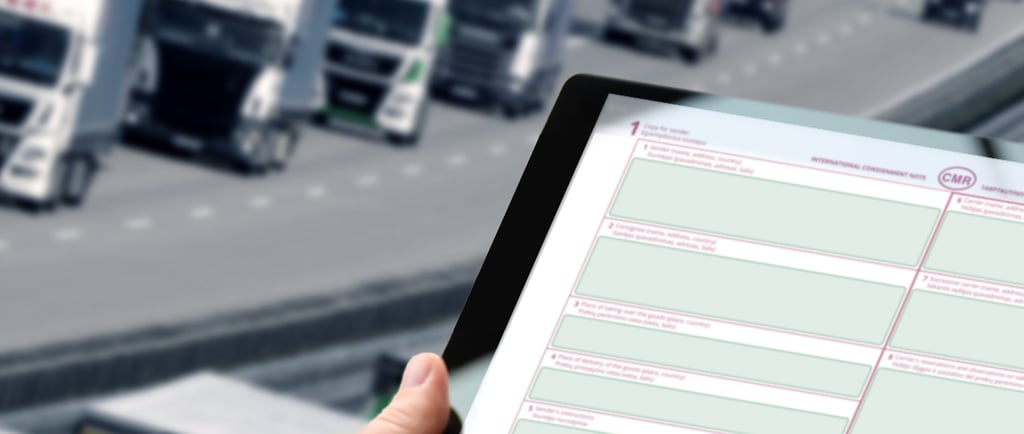Solutions Cargo Sign Offers
From December 2026, all European Union Member States' competent authorities will be accepting electronic freight transport information (eFTI) from economic operators. Simultaneously, the obligation for almost everyone in the supply chain to record their carbon footprint becomes mandatory from 2026. Please read this article to understand how Cargo Sign solutions can benefit your business with these new regulations.
2/20/20252 min read
Replace paper CMR with eCMR
From December 2026 all European Union Member States competent authorities will be accepting the electronic freight transport information (eFTI) from the economic operators. Businesses within the logistics sector now have the opportunity to leverage electronic CMR (eCMR) instead of conventional paper documentation. Cargo Sign facilitates a efficient transition, providing support for enterprises seeking to migrate from the cost-intensive use of paper CMRs to the more efficient and sustainable eCMR solution. We have developed an electronic waybill that replicates the traditional paper CMR, ensuring a smooth and stress-free adoption process. This transition guarantees that drivers, declarants, and administrative teams can smoothly maintain their operational workflows while transitioning to the electronic format. The eCMR maintains a consistent appearance, aligning with the professional standards expected in the logistics industry.
CO2 calculator integrated to eCMR
On 14 July 2021, the European Commission adopted a series of legislative proposals setting out how it intends to achieve climate neutrality in the EU by 2050, including the intermediate target of an at least 55% net reduction in greenhouse gas emissions by 2030. The obligation for almost everyone in the supply chain to record their carbon footprint is fast approaching. From 2024, large companies will need to publicly disclose information on the way they operate and manage social and environmental risks. The new EU sustainability reporting requirements will apply to all large companies (with over 250 employees and a 40 million euro turnover, as defined in the Accounting directive), whether listed or not. Carbon Border Adjustment Mechanism CBAM becomes operational in its definitive phase on 1 January 2026 for small and medium-sized enterprises. Cargo Sign aligns with the decisions of the European Commission, supporting logistics businesses in preparation for upcoming regulations. Our eCMR includes an integrated CO2 calculator for more convenient emissions reporting. At the end of the year, businesses using Cargo Sign can easily generate a comprehensive report from all eCMRs, presenting total emissions data to authorities.
Setup eCMR to your business flow
Cargo Sign has transformed the traditional paper CMR consignment note into an electronic format, ensuring a smooth transition for your daily business operations. You won't need to invest time and effort in learning a new way of working. The process of eCMR prefiling, previously tied to paper, smoothly shifts to computers and tablets, with the added convenience of automation to simplify prefilling. We've introduced the option to integrate the eCMR prefill form into your Transport Management System (TMS). Upon request, our developers can automate eCMR prefilling from your order management module with just a few clicks. Additionally, your business will benefit from our integrated CO2 calculator, making Scope 3 reporting an easy task. Cargo Sign actively participates in various EU-funded projects, providing insights to the EU Commission about business needs. There's a possibility that the approval of a standardized eCMR data standard for Scope 3 emission reporting will make reporting via the eFTI dataset even more convenient. Integrate Cargo Sign into your business processes to achieve compliance and efficiency benefits in one go.
Regulations and updates
Cargo Sign actively participates in several initiatives for digitizing the logistics sector within the European Union. We stay informed about European Commission news and regulations, consulting with various organizations such as eFTi4EU, the Admiral project, the Lithuanian The State Tax Inspectorate, the Transport and Innovation Association, and members of the European Commission. Additionally, we align our practices with industry standards, including the GHG Protocol, GLEC Framework, and ISO standards. Our commitment is to ensure that our product remains compatible with the latest regulations and updates.



